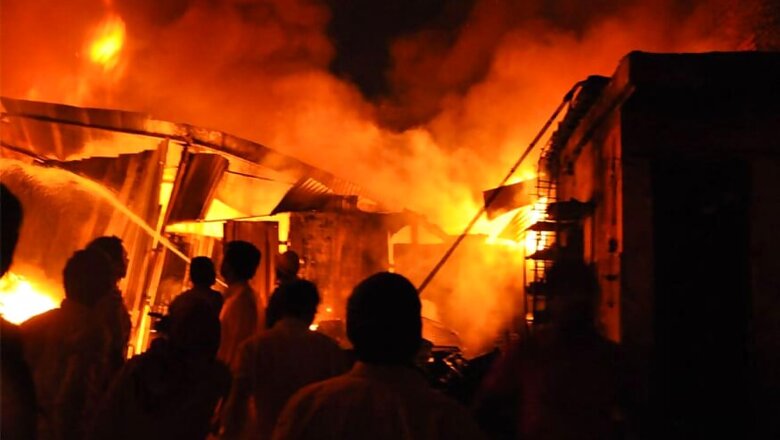
views
On January 20, 17 workers were charred to death in a fire that broke out in a cracker factory in outer Delhi’s Bawana industrial area. The factory was not licensed for the work it was performing - packing of explosive materials. People were working on contract basis. Complaining would mean losing their job. There were no inspections.
Under the current government policy, inspection of factories and enforcement has been replaced by 'self certification’ system. The absence of safety standards, enforcement, and job security sets the stage for Bawana-type disasters all over the country.
The Bawana incident is not unique. Last month, 12 migrant workers were burnt to death in a chiwda manufacturing unit in Mumbai's Sakinaka. This happened days after the Kamala Mills fire tragedy in which 14 people lost their lives.
In 2017, the Delhi State Industrial and Infrastructure Development Corporation (DSIIDC) reported more than 450 fire emergencies, out of which five reported casualties.
In incidents reported in 2017 - on February 24, March 26, April 19, May 26 and September 7 - workers died as fire engulfed their factories. Even in 2018, four labourers were charred to death at a chemical plant in Vadodara after fire broke due to a blast. Since the death count was in single digit, it failed to make headlines.
In industrial areas like Bawana (NCR), Dombivli (Thane), Vapi (Gujarat), with thousands of big and small factories, many of them involving hazardous processes, fires are routine. Deaths are not uncommon. In 2016, an explosion in a chemical factory at Dombivali killed an unspecified number of workers. At least 12 bodies were recovered and more than 150 persons were injured.
The death count is not only increasing at small unregulated private concerns but also in public sector establishments. In the boiler explosion at the NTPC's thermal power plant in Uttar Pradesh's Unchahar, in November 2017, 43 people lost their lives. The dead were mostly contract workers, but it also included several officers of the NTPC.
According to the NTPC employees, the disaster was a direct consequence of pressure from the ministry to boost power, leading to bypassing SOPs and performing maintenance without shutting down the boiler.
The government policy is at the root of the problem. Twenty-three bodies were recovered from Jharkhand's Lalmatia mines in December 2016, after a heap of mud caved-in at the entry of the mines. According to labourers, there were about 70 people working at the open cast coal mine, who were buried in the collapse, all on contract.
The workers had reported to the officials of a crack in the heap of mud two days before the incident, but they were ordered to continue working. Regular workers would have refused but those who work on contract have no choice. Few months before the tragedy, the central government, in order to boost coal production, lifted the prohibition on contract labour for to ease the burden on coal mines.
Industrial hazard and pollution usually go hand in hand. Industrial safety and pollution control require strict standards coupled with strict policing of these standards. When both standards and policing are diluted for whatever reason, including ‘ease of doing business’, the results lead to a spike in accidents, and increase in air, water and land pollution.
This can clearly be seen in a state like Gujarat, which has the dubious distinction of having two of its cities, Vapi and Ankleshwar, included in the list of the 20 most polluted cities in the world. The industrial estate of Vapi, which has a large concentration of big and small chemical industries, is not only the most polluted, but is also one of the most unsafe in the country.
A simple internet search will show that fires are regular occurrences and deaths of workers are not uncommon. In 2014, the latest year for which the government statistics are published, Gujarat had the highest number of fatalities in industrial accidents.
Nishit Dand, vice-chairman of central Gujarat, Confederation of Indian Industry, and managing director of a safety equipment manufacturing company has gone on record to say that "one of the reasons for high industrial accidents and deaths is lack of safety measures in plants and lack of awareness among the migrant workers about their rights. Even the contract-based system has ensured that both contractor and the company escape their responsibility of ensuring the safety of workers."
The occurrence of tragedies (accidents and fires) is likely to increase due to further dilution of labour and safety standards among the states. In 2016, the Fadnavis-led Maharashtra government amended the Factories Act to exclude all factories from employing workers under the age of 20 from its purview. (Previously, the limit was 10 workers).
Factory inspection has been replaced by a system of ‘self certification’. The Contract Labour Act has been amended last year in Maharashtra, restricting contractors to employ 50 workers. Similar dilution of labour standards and enforcement has been legislated in BJP-ruled states such as Rajasthan, Gujarat, Chattisgarh and Madhya Pradesh.
Trade Unions, cutting across political affiliation, are demanding a stronger policy for labour standards and enforcement of safety. They are demanding that workers be given rights to directly prosecute an employer for violation of safety standards embodied in the Factories Act. They also understand that such policy change will require a political change in the country.
(The author is secretary of Centre of Indian Trade Unions (CITU), Maharashtra. Views are personal.)




















Comments
0 comment